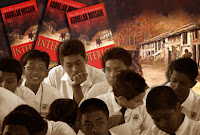PETALING JAYA: Part of the trouble with Interlok, say its detractors, is that the author does not seem to know what he is writing about.His novel assumes, for example, that all South Indians who immigrated to Malaya belonged to the caste of Untouchables and that Kerala, the home of Malayalam speakers, is “a little north” of Tamil Nadu.The book, written by national laureate Abdullah Hussein, has become a controversial title and several groups have demanded that the Education Ministry withdraw it from the list of textbooks for Malay literature students in Form Five in Kuala Lumpur, Selangor, Putrajaya and Negri Sembilan. They say it belittles the Indian community and its belief system.
Published in 1971, it attempts to portray the different lifestyles of the three main ethnic communities in pre-independence Malaya.Although he presents stereotyped portrayals of all three communities, the author is particularly insulting to the Indians, according to the critics. Even the MIC has registered its disapproval, and Education Minister Muhyiddin Yassin has caved in, calling for a review of the book’s use as in school.
No in-depth knowledge
MIC secretary-general T Rajagopalu noted that the writer called all Indians immigrants “pariah”.In a passage on Page 211, he writes: “Mereka yang dari arah ke utara sedikit bercakap bahasa Malayalam atau Telugu tetapi hampir semuanya tahu bahasa Tamil. Malayalam dan Telugu. pun berasal dari satu rumpun bahasa Dravidia. Satu perkara besar yang membuatkan mereka senang bergaul adalah kerana mereka tergolong dalam satu kasta Paria. Mereka tidak perlu takut mengotori sesiapa kalau bersentuhan.”
(They who are from places a little north speak Malayalam or Telugu, but almost all of them know Tamil. Malayalam and Telugu originated from the Dravidian language family. One big reason why it is easy for them to mingle with one another is that they all belong to the Pariah caste. They don’t have to worry about polluting anyone if they come into physical contact with one another.)Rajagopalu welcomed Muhyiddin’s call for a review although he said it was a little late. He said the book had no place in schools.
“The author does not have an in-depth knowledge of the caste system,” he said. “They should have sent the book for a review to the professors at the Indian Studies Department of Universiti Malaya.”Another obvious error in the book is in the mention of a “dewa Palikai” on Page 227: “Setelah menjalankan upacara ankurarppanam, upacara pemujaan yang dilakukan dengan periuk tembikar berisi sembilan macam tunas-tunas biji-bijian, doa pun dibaca untuk dewa Palikai.”
(After performing the “ankurarppanam” ritual, worship is done using claypots containing nine types of seedlings, and prayers are offered to the deity Palikai.)Palikai actually refers to the nine pots. The word can also refer to a young protectress, writes professor of religion Alf Hiltebeitel in the book On Hindu Ritual and The Goddess.
Source : http://www.freemalaysiatoday.com/2011/01/11/unravelling-interlok/

1 comment:
Thanks for sharing. Many Malays still say all Indians are from pariah caste and they encourage all Malays to read Interlok.
Post a Comment